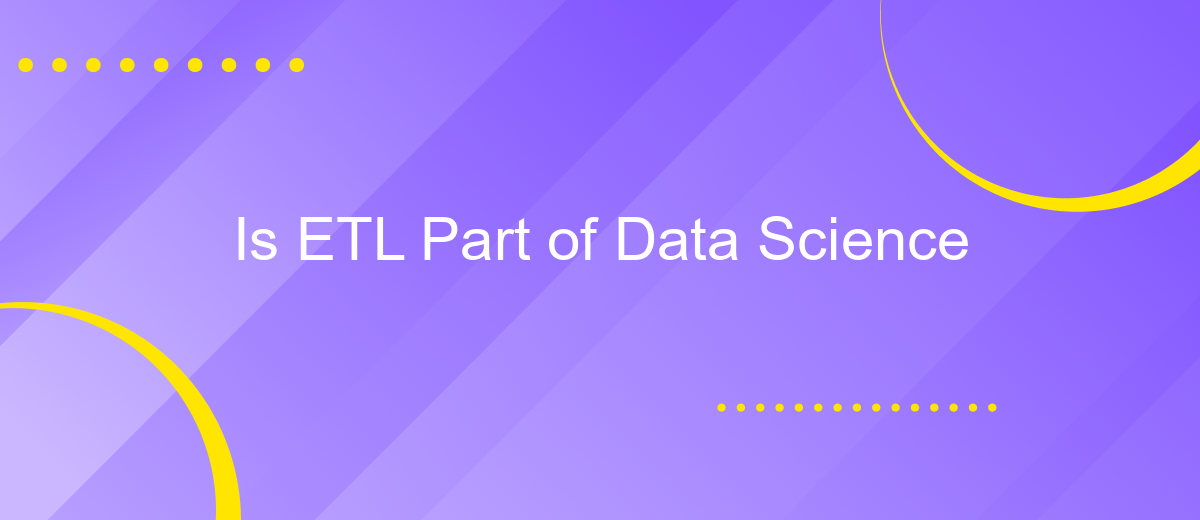Is ETL Part of Data Science
Extract, Transform, Load (ETL) processes play a crucial role in the realm of data management, but their place within the broader scope of data science often sparks debate. This article explores whether ETL is an integral component of data science, examining how these processes support data preparation, analysis, and ultimately, the generation of valuable insights.
Introduction
Data science has become a crucial aspect of modern business and technology, driving insights and innovations across various sectors. One of the key components in the data science workflow is ETL (Extract, Transform, Load), which involves extracting data from various sources, transforming it into a usable format, and loading it into a destination system for analysis. This process ensures that data scientists have clean, structured, and relevant data to work with.
- Extract: Gathering data from multiple sources.
- Transform: Cleaning and structuring the data.
- Load: Storing the processed data in a database or data warehouse.
While ETL is a fundamental part of data science, it often requires significant effort and technical expertise. Tools like ApiX-Drive simplify this process by automating data integration and transformation tasks, allowing data scientists to focus more on analysis and insights rather than data preparation. By streamlining ETL processes, services like ApiX-Drive enhance productivity and ensure data accuracy, making them invaluable in the data science toolkit.
What is ETL?

ETL, which stands for Extract, Transform, Load, is a fundamental process in data management and analytics. It involves extracting data from various sources, transforming it into a suitable format, and loading it into a target database or data warehouse. This process is essential for consolidating data from disparate sources, ensuring data quality, and making it ready for analysis. ETL helps in cleaning, filtering, and enriching raw data, thus enabling businesses to derive meaningful insights and make informed decisions.
Many modern tools and services facilitate the ETL process, making it more efficient and user-friendly. One such service is ApiX-Drive, which allows seamless integration of various applications and data sources. ApiX-Drive simplifies the ETL process by automating data extraction, transformation, and loading tasks, reducing the need for manual intervention. This not only saves time but also minimizes the risk of errors, ensuring that data is accurate and up-to-date. With ApiX-Drive, businesses can easily manage their data pipelines and focus on leveraging data for strategic purposes.
What is Data Science?

Data science is an interdisciplinary field that combines various techniques and tools to extract meaningful insights from data. At its core, data science involves the collection, processing, and analysis of large datasets to inform decision-making and solve complex problems. This field leverages expertise in statistics, computer science, and domain-specific knowledge to transform raw data into actionable intelligence.
- Data Collection: Gathering data from various sources, including databases, APIs, and web scraping.
- Data Processing: Cleaning and transforming the data to ensure its quality and usability.
- Data Analysis: Applying statistical and machine learning techniques to uncover patterns and trends.
- Data Visualization: Creating visual representations of data to communicate findings effectively.
- Data Interpretation: Drawing conclusions and making recommendations based on the analysis.
Data science is essential in today's data-driven world, enabling businesses to make informed decisions and gain a competitive edge. Tools like ApiX-Drive can facilitate the integration and automation of data flows, ensuring seamless data collection and processing. By leveraging such services, data scientists can focus on analysis and interpretation, ultimately driving innovation and efficiency.
Is ETL Part of Data Science?

ETL (Extract, Transform, Load) is a fundamental process in the field of data management and analytics. It involves extracting data from various sources, transforming it into a suitable format, and loading it into a data warehouse or other storage systems. While ETL is crucial for preparing data for analysis, its role within data science is often debated.
Data science encompasses a wide range of activities, including data cleaning, exploratory data analysis, statistical modeling, and machine learning. ETL processes are typically seen as part of the data engineering domain, which focuses on the infrastructure and tools needed to collect, store, and process data. However, effective ETL processes are essential for data scientists to access clean and well-structured data for their analyses.
- ETL ensures data quality and consistency.
- It enables seamless integration of data from disparate sources.
- Automated ETL tools, like ApiX-Drive, can streamline data workflows.
In conclusion, while ETL is not exclusively a data science task, it is an integral part of the data pipeline that supports data science activities. Tools like ApiX-Drive facilitate the automation of ETL processes, allowing data scientists to focus more on analysis and modeling rather than data preparation.
- Automate the work of an online store or landing
- Empower through integration
- Don't spend money on programmers and integrators
- Save time by automating routine tasks
Conclusion
In conclusion, the role of ETL (Extract, Transform, Load) in data science is undeniably significant. While data science encompasses a broader scope that includes statistical analysis, machine learning, and predictive modeling, ETL processes are foundational for preparing and managing data. Without efficient ETL operations, data scientists would struggle with data quality issues, leading to inaccurate insights and suboptimal decision-making.
Moreover, modern tools and services like ApiX-Drive have simplified the integration and automation of ETL processes. These platforms enable seamless data flow between various systems, ensuring that data scientists can focus more on analysis rather than data preparation. By automating repetitive tasks and ensuring data consistency, services like ApiX-Drive enhance the overall efficiency and effectiveness of data science projects. Thus, while ETL is not the entirety of data science, it is an essential component that supports and amplifies the impact of data-driven initiatives.
FAQ
Is ETL Part of Data Science?
What is the role of ETL in Data Science?
Can ETL be automated in Data Science projects?
How does ETL improve data quality in Data Science?
Is knowledge of ETL necessary for a Data Scientist?
Apix-Drive is a simple and efficient system connector that will help you automate routine tasks and optimize business processes. You can save time and money, direct these resources to more important purposes. Test ApiX-Drive and make sure that this tool will relieve your employees and after 5 minutes of settings your business will start working faster.


